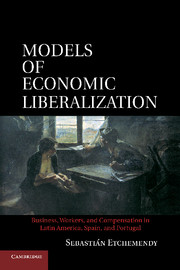 Models of Economic Liberalization
Models of Economic Liberalization Book contents
- Frontmatter
- Contents
- Acknowledgments
- Part I The Intellectual Terrain
- Part II The Political Economy of Business Adjustment
- 3 Compensating Business Insiders
- 4 Statist and Corporatist Models of Business Adjustment in Spain and Argentina
- 5 Exceptions That Prove the Rule
- Part III The Political Economy of Labor Adjustment
- Part IV The Market Model
- Part V Comparative Perspectives in Ibero-America
- 10 Conclusions
- Appendix
- Bibliography
- Index
4 - Statist and Corporatist Models of Business Adjustment in Spain and Argentina
Sectoral Case Studies
from Part II - The Political Economy of Business Adjustment
Published online by Cambridge University Press: 07 October 2011
- Frontmatter
- Contents
- Acknowledgments
- Part I The Intellectual Terrain
- Part II The Political Economy of Business Adjustment
- 3 Compensating Business Insiders
- 4 Statist and Corporatist Models of Business Adjustment in Spain and Argentina
- 5 Exceptions That Prove the Rule
- Part III The Political Economy of Labor Adjustment
- Part IV The Market Model
- Part V Comparative Perspectives in Ibero-America
- 10 Conclusions
- Appendix
- Bibliography
- Index
Summary
Introduction
The sectoral case studies presented in this chapter explain in more detail the policymaking process and the administration of compensation involved in the Statist and Corporatist models of business adjustment. The chosen sectors share two principal characteristics. First, they were potential losers, that is, produced intermediate or durable goods that enjoyed widespread protection, and, unlike other branches of industry with more comparative advantages – such as the food industry in both countries – were seriously threatened by economic liberalization and integration into regional and global markets. Second, these sectors were paradigms of the dominant pattern of restructuring in each country. Steel and shipbuilding will be more extensively analyzed in the Spanish case. There is wide agreement among Spanish specialists (Navarrro : 118; Castaner : 86) that they constituted the two core sectors in the restructuring project, considering manpower and funds involved. The largest firms in the sectors selected in Argentina, steel, oil, and autos, were, as noted in , the main beneficiaries of market-share compensation in terms of both volume of assets acquired in privatization and important episodes of partial deregulation. Hence, this chapter focuses on crucial “positive” cases of business adjustment in each liberalization model. studies “negative cases,” that is, important ISI sectors that were not compensated according to the model prevalent in each country.
The analysis of the national liberalization models in advanced two major hypotheses. First, it argued that nonrepressive democratic regimes in which business has more avenues for lobbying, such as those in Argentina and Spain during the neoliberal period, make compensation to ISI business insiders more likely. Second, I posited that the model of industrial restructuring was to a great extent conditioned by the type of ISI business actors that evolved under the inward-oriented model. A trajectory in which domestic private ISI business groups have been losing ground vis-à-vis the state and are economically weak prior to reform turns state dirigisme from above and (especially in a democratic environment) subsidy compensation more feasible. Conversely, a configuration in which domestic business groups have become hegemonic under ISI (displacing both the state and/or foreign TNCs) and are economically strong is more favorable to the pressure of business insiders from below, and to the negotiation of market-share compensation.
- Type
- Chapter
- Information
- Models of Economic LiberalizationBusiness, Workers, and Compensation in Latin America, Spain, and Portugal, pp. 88 - 125Publisher: Cambridge University PressPrint publication year: 2011


